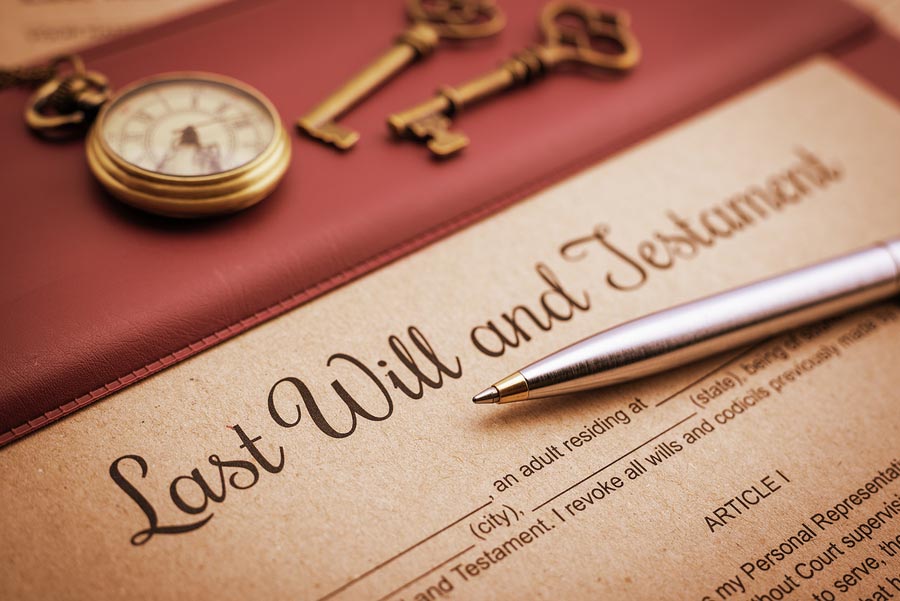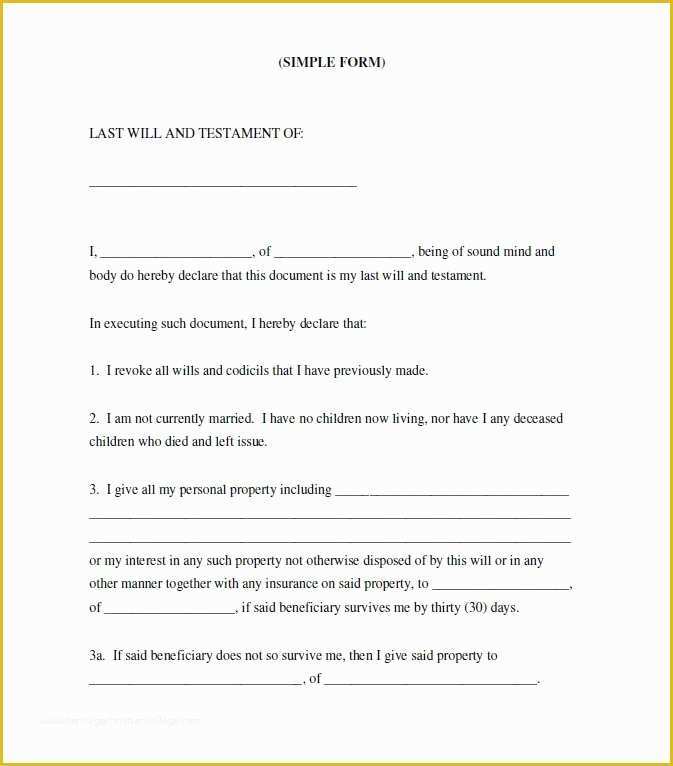
How to write a Will: A step-by-step guide 1. Document Title Typically the headline would be: LAST WILL AND TESTAMENT 2. Declaration You will state your full name and residential address, with a declaration that: You are of legal age to 3. Name an Executor and/or Trustee People typically name the Step 1 – In the header area, write to whom the will is for and in the first paragraph their details shall be entered as follows: After “I”, enter the same name as in the header. City, County, and State. Step 2 – Fill-in who will represent as the personal representative (also known as the ‘executor’) of the will Having a Lawyer Write Your Will. If you decide that your situation is too complicated to write your own will, or if you would just rather have a professional do it, then you'll need a lawyer's help. But hiring a lawyer doesn't mean you need to hand over the entire process or spend an outrageous amount of money
Free Last Will and Testament Template (Will) - Word | PDF – eForms
Understanding how writing a will write a will, also known as a last will and testament, is an important part of preparing for your future. Having a will in place ensures your assets and possessions are distributed according to your wishes — reducing the risk of family quarrels writing a will legal hassles, writing a will.
Today, you can easily write your own will with the help of the internet. Writing a will may sound complicated, but writing a will is easier than you might think. Generally, if you write your will according to the laws of your state, it should be deemed valid in all other states. However, this is not always the case.
For example, a holographic willwhich is written and signed entirely in the handwriting of the testator owner of the willis valid in Texas but not in Florida. An executor is the person responsible for ensuring the wishes expressed in your will are carried out after you die. Acting as an executor can present challenges, and requires an on-going time commitment due to lengthy probate processes.
Consider offering your executor compensation for accepting the role. You can choose an individual or an institution such as a bank, trust, or company to serve as your executor. Over time, your preferred beneficiaries may change. A dependent is a child or relative that relies on you as their primary source of income. For example, your dependents may be both your 8-year-old daughter and your year-old mother.
Additionally, you can name alternate guardian s in case your first — or even second — choice is unable to assume the responsibilities. If you want to ensure your assets go to the right people after you die, be specific. Imagine leaving all your belongings to your second spouse hoping that they know you wanted them to share everything with your children from your first marriage. If you leave your entire estate to a spouse or other family member, they are legally entitled to do what they want with it.
However, if someone in your family is particularly attached to your engagement ring, you could specify that this particular item go to them before your jewelry collection is sold. When you sit down to set up a will, listing items and allocating them to your loved ones might seem impersonal. Thankfully, writing a will, your writing a will will and testament can be more than just a clinical legal document.
If you want to say something meaningful, you may also attach a letter to the will. Doing so lets you say goodbye to your loved ones, as well as clarify your final wishes. All states specify that a minimum of two witnesses must sign a will in order for it to writing a will considered legally binding. Some states, writing a will, such as Vermont, require three witnesses. If you decide to supplement your will with a trust, make sure you understand which type of trust to use and their differences, especially when it comes to revocable vs irrevocable trusts.
Although no states require you to register your completed will, some states and counties allow you to log information about your will, or file it with a probate court. If you use an estate attorney to write your will, they will likely offer to store it at their office for safekeeping. You could live for decades after making your will, allowing plenty of time for significant events such as marriage, divorce, writing a will, the birth of children — even disputes with loved ones.
Unless you update your will, you could writing a will up leaving all your belongings to somebody you stopped speaking to long before your death. Mollie Moric is a staff writer at Legal Templates.
She translates complex legal concepts into easy to understand articles that empower readers in their legal pursuits.
Her legal advice and analysis Skip to primary navigation Skip to main content Skip to primary sidebar Skip to footer Understanding how to write a will, writing a will, also known as a last will and testament, is an important part of preparing for your future.
Can You Write Your Own Will? How to Make a Will in 10 Steps It may sound complicated, but writing a will is easier than you might think. Understand the Legal Requirements in Your State Generally, if you write your will according to the laws of your state, writing a will, it should be deemed valid in all other states.
These differences in state property laws may affect the distribution of your assets. Select an Executor for Your Will An executor is the person responsible for ensuring the wishes expressed in your will are carried out after you die. Consider the following assets when setting up your will: Real estate, land, and buildings Personal property, such as cars, jewelry, and furniture Checking and savings accounts Stocks and bonds Intellectual property such as copyrights, writing a will, patents, and royalties Business ownership Over time, your preferred beneficiaries may change.
Designate Guardians for Your Dependents The next stage in making a will is to choose guardians for your dependents, if you have any.
Be Specific about Your Wishes If you want to ensure your assets go to the right people after you die, be specific. Include Additional Messages in a Letter When you sit down to set up a will, listing items and allocating them to your loved ones might seem impersonal.
Get Witness Signatures Once you have signed the will yourself, you will need to get witnesses to sign the document. Mollie Moric Staff Writer Mollie Moric is a staff writer at Legal Templates. Legal Documents All Legal Forms Business Forms Real Estate Forms Estate Planning Forms Personal and Family Forms.
Popular Forms Lease Agreements Power of Attorney Forms Eviction Notice Living Will Non-Disclosure Agreement. Company Home Writing a will Blog About Us Careers Contact Us Partner With Us. Users Account Terms of Use Privacy Policy Do Not Sell My Personal Information.
4 Reasons NOT To Have A Living Will
, time: 11:54How to Write a Will | Write Your Own Will in 10 Easy Steps

Step 1 – In the header area, write to whom the will is for and in the first paragraph their details shall be entered as follows: After “I”, enter the same name as in the header. City, County, and State. Step 2 – Fill-in who will represent as the personal representative (also known as the ‘executor’) of the will Writing a will isn't the most pleasant of tasks. After all, by doing so you're not only acknowledging your own inevitable demise but actively planning for it. That might explain why so many adults avoid this cornerstone of estate planning. According to an AARP survey, 2 out of 5 Americans over the age of 45 don't have a blogger.com: Brett Widness Having a Lawyer Write Your Will. If you decide that your situation is too complicated to write your own will, or if you would just rather have a professional do it, then you'll need a lawyer's help. But hiring a lawyer doesn't mean you need to hand over the entire process or spend an outrageous amount of money
No comments:
Post a Comment